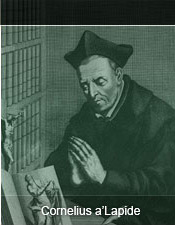The divorce between sanctity and scholarship that has grown ever wider since the Reformation is perhaps the greatest impediment today to the study of the Scriptures or Theology of any kind. For the first fifteen centuries of Christianity’s existence, it was presumed that one studied and commented on the Bible as part of one’s own personal quest for holiness and salvation. The Fathers of the Church, those great Saints of the first six hundred years, whose commentaries, for the most part, have formed the Church’s scriptural exegesis, were just that — great Saints. So too, with the Scholastics of the Middle Ages, such as Sts. Anselm, Aquinas, and Bonaventure, and Bl. Duns Scotus. But from the time of Martin Luther, biblical research has tended to degenerate ever more into either an intellectual exercise or a search for textual weapons with which to belabor ideological opponents. Perhaps one of the last major commentators to bridge the gap between piety and scholarly proficiency was the compiler of the four volumes now offered here, Cornelius a'Lapidé S. J. (1567-1637).
As a young man, a'Lapide studied humanities and philosophy at the Jesuit colleges of Maastricht and Cologne, theology first, for half a year, at the University of Douay, and afterwards for four years at Louvain; he entered the Society of Jesus, June 11, 1592, and, after two years novitiate and another year of theology, was ordained in 1595. Eventually he was called to Rome where he taught for many years. The latter years of his life, however, he devoted almost exclusively to finishing and correcting his celebrated commentaries. He was a sincerely pious and zealous priest and an exemplary religious. With his Jesuit brethren at Rome he enjoyed so high a reputation for sanctity that, when he died, they gave him a separate burial place, in order to be the more certain of finding his bones when eventually, as they hoped, he should receive the honor of beatification.
Cornelius a'Lapidé was a contemporary and co-worker with another famous Jesuit and Scripture commentator, St. Robert Bellarmine. He and many other diverse Catholic scholars and theologians from the 17th Century to the 21st Century, men such as Dom Guéranger, Denis Fahey, Leonard Feeney, and Scott Hahn, have praised and utilized the commentaries of a'Lapidé. So complete and scholarly is this work of a lifetime that it was practically the universal commentary in use by Catholics (often available only in 30 some Latin volumes) for hundreds of years. Its brilliance was so renowned that the first partial translation of these Latin volumes a'Lapidé produced, was done by a Protestant, an Anglican by the name of Thomas Mossman, in the 19th Century. He and many other Protestant scholars have also recognized a'Lapidé’s work as the greatest Scripture commentary ever.
As part of the mission of Loreto Publications’ apostolate we have spent a lot of time and money over the last four years to produce a translation and design a beautiful edition of this priceless commentary so long hidden from the eyes of most Catholics. Now is your opportunity to step forward and help us complete the production of this masterpiece, to help the Church move ahead boldly into the 21st Century.
